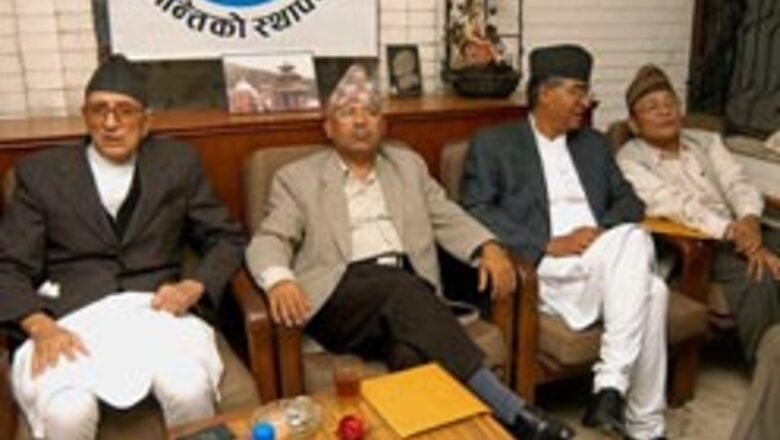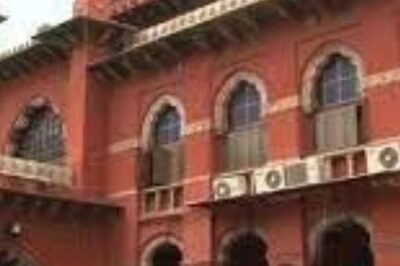
views
Kathmandu: Nepal's opposition leaders gathered on Tuesday for their formal response to King Gyanendra's offer overnight to reinstate Parliament--a pivotal concession after weeks of mass protests that threatened to force him from power.
Leaders of the seven-party opposition alliance were expected to call off the rallies and general strike that sparked bloody clashes with security forces leaving 14 protesters dead.
Several party leaders, however, already indicated they were pleased with the king's announcement, and that their followers were thrilled.
"We have forced the king to his knees," said Rajan Sreshta, an opposition activist waiting outside the scene of Tuesday's meeting. "It shows the people are the actual power."
Seeing he had few choices left and hoping to avoid an even more bloody showdown, Gyanendra's announcement late Monday cleared the way for the creation of a new constitution that could leave him largely powerless, or even eliminate the monarchy.
Gyanendra also expressed his sympathies for the 14 demonstrators killed by his security forces.
"We extend our heartfelt condolences for all those who have lost their lives in the people's movement," Gyanendra said in the address, broadcast on state television and radio.
By early Tuesday morning, life was almost normal in Katmandu, where the crisis had alternately filled streets with protesters or emptied them because of curfews: mobile phones, switched off by the government in an attempt to disrupt protest organizers, were back on; stores reopened; volunteers passed stones hand-to-hand, clearing the roads of blockades.
Nepal's three largest opposition parties welcomed the king's comments, and the sounds of celebratory shouts and whistles could be heard in the streets of Katmandu minutes after the 11:30 p.m. speech.
Gyanendra "has addressed the spirit of the people's movement" and met the demands of the main opposition seven-party alliance, said Ram Chandra Poudel, general secretary of the Nepali Congress.
PAGE_BREAK
The address effectively handed power back to elected politicians hours before the largest planned protest yet, with hundreds of thousands of people expected to attend.
From now on, the seven-party opposition alliance would "bear the responsibility of taking the nation on the path of national unity and prosperity," Gyanendra told Nepal.
"We are confident the nation will forge ahead toward sustainable peace, progress, full-fledged democracy and national unity," said the king, sitting rigidly in front of a blue backdrop decorated with royal emblems.
For much of the crisis, Gyanendra had remained silent and invisible, hidden behind the walls of his heavily guarded central Katmandu palace and kept in power because of the loyalty of his army and police.
The reaction of Nepal's Maoist guerrillas, who have seized much of the rural heartland in a bloody decade-long quest for power and who had joined with the alliance to back the protests, remained unknown.
However, their influence has surged with the protests, and they would almost certainly lobby for a role amid all the political changes.
Reinstating Parliament's lower house was a key alliance demand. The king called the chamber to convene Friday afternoon.
It was expected to create an interim government under the alliance's plan, which would then set up special elections for an assembly.
That assembly, in turn, would write a new constitution. Parliament's lower house holds real elected power in Nepal's constitution.
Most opposition leaders favor a constitution that would give Nepal a ceremonial monarchy, or simply eliminate the royalty completely. Earlier on Monday, foreign diplomats had struggled to cut a deal to end the crisis.
Countries with strong ties to Nepal encouraged Gyanendra to give the opposition alliance what it was demanding, including the reinstatement of Parliament and an apology for the killed demonstrators, said a diplomat, speaking on condition of anonymity because of the sensitivity of the discussions.
Another person familiar with the discussions, also speaking on condition of anonymity, confirmed the negotiations, adding that India was among those in the forefront of the talks.
Protests have rocked Katmandu and many other towns for nearly three weeks, and police have clashed repeatedly with demonstrators demanding Gyanendra relinquish the control he seized 14 months ago when he dismissed an interim government, saying he needed to bring order to the chaotic political situation and crush the Maoist insurgency.

















Comments
0 comment